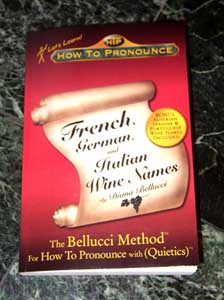-
- Same-sex couples prepare for next step in marriage war
- San Francisco spree of marriages for gays and lesbians continues
- Rep. Barney Frank opposes San Francisco’s effort
- Bush to back constitutional ban on marriage for gays and lesbians
- Chicago Mayor Daley says he has ‘no problem’ with same-sex couples
- Fix to human rights law passes New Mexico Senate
- Protesters urge removal of justices Say amending constitution is not the answer
- National News Briefs
- World News Briefs
dining out
Help for the pronunciation impaired
Published Thursday, 26-Feb-2004 in issue 844
Ordering a bottle of European wine in stores or restaurants can be pretty embarrassing if you haven’t done your linguistics homework. You’ve seen the logo and recognize the spelling. And you’re probably familiar already with its flavor. But try to pronounce it – and you might as well be talking with a dozen grapes in your mouth.
La Jolla author Diana Bellucci’s latest book, How to Pronounce French, German and Italian Wine Names, is like an on-time ambulance for challenged tongues that become wholly paralyzed when trying to articulate wines such as Zentralkellerei Sonnenuhr and Il Querciolaia. Yet with more than 15,000 wine names, terms and regions listed in the guide, the days of uttering “peanut nowhere” for Pinot Noir could soon be over.
“I heard mispronunciations all around me and saw this as a big problem,” says Bellucci. “So I decided to celebrate the wonderful diversity of wine by giving it some grace and honor.”
Bellucci helps consumers untie their tongues through a two-tiered approach using her Bullucci Method and another trademark system called “Quietics”. The former helps readers unravel dialects of different languages through phonetic keys and instructions, which allow them to pronounce foreign terms correctly on the first try. The latter involves thinking of a sound, but not actually saying it, in order to conquer those tricky German umlauts and rolling Spanish “r’s”.
[T]he days of uttering “peanut nowhere” for Pinot Noir could soon be over. For example, by merely thinking of an “l” before pronouncing rojo [ro-ho], the user can roll out the word with better fluency and conviction. “It’s a brain trick that works,” Bullucci adds.
The combined systems are particularly useful in capturing special-case scenarios where geopolitics have led to hybrid pronunciations stemming from regions like Alsace, which embody both German and French dialects. And in other cases, the book captures the inflections of archaic idioms originating from vineyards that were founded hundreds of years ago.
“I wanted to solve the problem scientifically and have the outcome be easy for the readers. The book gives them the flexibility to hop from language to language when needed,” notes Bullucci, referring to a national television commercial she once heard for Pinot Grigio. “The narrator pronounced the wine all in French. But the grigio requires that it be said in Italian.”
Bullucci teamed up with a small army of local language teachers when writing the book, all of whom are native to their respective countries. Of the 19 French teachers she approached, for example, only three were able to take on the project. “One of them said it was too difficult and walked out of the interview. It took a year of concentrated effort. And I rarely took a day off.”
The book, which retails for $30, serves as the ultimate guide for consumers, collectors and teachers of wine, and includes pronunciations for ports and sherries as well. It is currently available in all major bookstores, select wine shops and on the Internet. For more information visit www.gaylesbiantimes.com and click on this article for a link to the book’s website.
|
|
Copyright © 2003-2025 Uptown Publications


